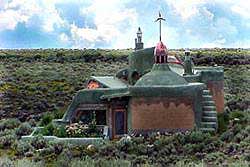Composting and community gardening
Composting is a tried-and-true method of seasoning food waste
for your garden. Composted waste creates rich soil fertilizer and excellent
food for garden plants. Mulched and seasoned properly, good compost ensures a healthy and prosperous garden. All food waste makes good compost including: refrigerator "leftovers", meat & vegetable matter, egg shells, fruit, bones, grass clippings, leaves, sawdust, even human and animal waste.
The compost must be cycled properly to allow a full bio-degradation process. It has to go through a full rotting to eliminate all dangerous bacteria. Mixing and turning regularly allows compost to attain necessary heat to decompose. In order to create good compost you must make a good space for the compost (10' X 10'), the waste material should be put in a pile, and in order for a full biodegrading cycle, compost should be turned every 2 wks.-1 mo. to assure proper "seasoning".
Turning the pile helps it biodegrade completely. A full biodegradation cycle should be completed in about 3 months in warm weather. Anaerobic cold weather it will take about about twice as long. The fully seasoned compost is now clean and makes for good fertilizer.
Community Gardening
Community gardening is a positive way to own your own garden, share gardening experience with friends and gardeners, save space and use resources efficiently. Plots are usually designed to ensure separateness and
shared composting bins and tools utilize tool sharing
Sustainable Community Gardening
Localized, community-based, organic gardening is an mark of class communities.
Commercial farming has a large impact on the environment and uses toxic
pesticides which degrade soil bases and poison and kill animals. Community
gardens have low environmental impact, utilize resources efficiently, and
empowers individuals garden work, and creates rich fresh food. All community gardens should be organic. Traditional practice allows individuals to procure healthy gardens without unnatural pesticides or fertilizers.
|
 |
|

Indoor organic gardening is one option to grow food inside away from
possible GMO contaminated air, build a garden inside the house, and grow
healthy organic fruits, vegetables and spices for your kitchen. Outside air should
be filtered and fans should circulate air for long periods everyday, humidity
should monitored and a CO2 machine is one possibility. Passive solar powered
hydroponic flood-type indoor gardening could be an option to make
a system that works efficiently, operates alone (self-watering, self-feeding),
and grows plants as fast as outdoors. Indoor gardening is hard work.
Composting your food waste is important. It makes rich fertilizer for
garden, averts garbage from landfills, and is healthy food for beneficial
garden plants and animals.
Localized, community-based food supply helps areas recover from foreign species integration, the "embodied-energy" and vehicles used to transport products is less, and efficiently builds smart, "well-knit" villages. It also creates insight to new alternatives from local resources.
Greywater systems and plumbing elimination
Greywater is a term used for utilizing waste water from sinks and
showers for gardening and other uses. Gardening water, leech fields and french
drains are all uses for waste water. Gardening water can be plumbed
from a greywater "sump" (or holding tank) to garden and lawn areas.
A leech field disposes of wastewater safely and averts water from the
city sewer system. A leech field is an underground field which spreads
water and allows soil to absorb the moisture naturally. A french drain
is a hole dug in the ground (usually 3-4 ft deep) and filled with
rock (larger rock at the bottom) to allow drainage, clay soils might
need a 4-6 ft deep hole.
Composting toilets are a good way to save water, plumbing and make
use of compostable waste. Be sure to buy a composting toilet which
works well to ensure sanitary compost and elimination of disease-carrying bacteria
and pathogens. Bio-Let and Sun-Mar both offer composting toilets. Look for basic
vault designs, they are easy to build, last long time, and require
little or no maintenance.
Most toilets nowadays waste 2-4 gallons of water every flush
so composting toilets save a lot of water.
For example: One four person toilet (3 gallons water per flush X 20 flushes per
day (average household)=60 gallons water. Defecation and urine can
be composted in plastic five gallon buckets, covered or mixed with wood
shavings, dirt, soil or sand and used as compost in local areas like
gardens, fields, (with respect to spreading and "shallow grave" techniques).
All human waste should be 100 feet from active rivers.
    
Contact Us |


